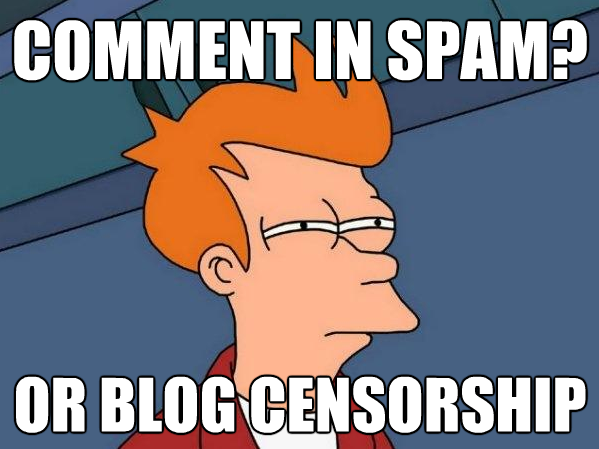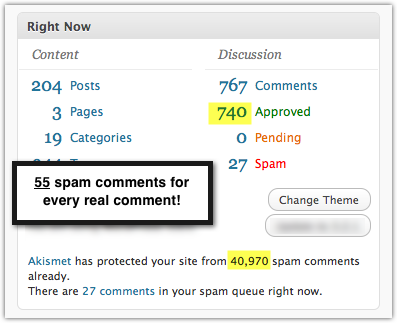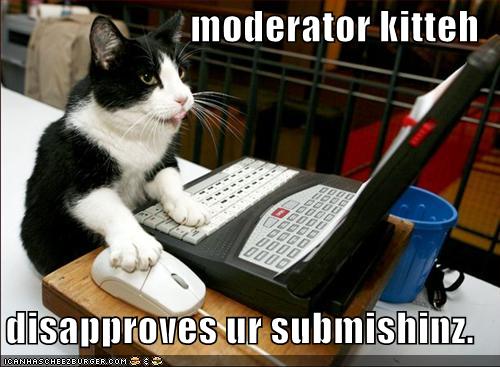In the past month I’ve left a number of comments on blogs only to find they were never published.

I’d like to believe that the blog owners simply didn’t see my comment. That it fell into their spam queue which they rarely, if ever, look at. Because the alternative is that they saw the post and decided to suppress it. Now, it’s their blog – their little corner of the Internet – but this type of censorship is troubling.
Comments Content
What about the content of my comments? To be fair, in some instances I was disagreeing with some or all of the content in that post. But I did so in a constructive manner, using links to my own thoughts on the topic or to other material to help round out my argument.
I regularly publish comments on this blog that are contrary to my own opinion. One only has to look at the comments on my Stop Writing For People post for examples. I’m free to respond and defend myself, but having the debate in the open is important. It builds trust, much like having bad reviews on a product is actually a good thing.
Comments are incredibly valuable because they provide additional information on the content. They make your content better through clarification, confirmation, addition and debate.
Comments = Content.
Comments are a rich source of meta information that deliver value to both readers and search engines. This extends to links as well! Relevant links in comments help create a web of information that users now and in the future will find useful.
Yet it is those links that may be at the root of the problem.
Comment Spam
It’s like the Internet version of a plague of locusts. One of the most popular ways to combat comment spam is to screen comments that have links. This is one of the default setting in Akismet.
It makes sense since many spammers will drop a link or links in comments. But links are not the problem. Spammers are the problem.
What’s wrong with contextual links to relevant content? This is not behavior that should be penalized. In fact, it should be encouraged. In many ways, the comment spam problem threatens the link graph.

Not only that but, anecdotally, it seems that comment spam sometimes pushes people to disable comments altogether. When the ratio of comment spam to real comments is too high, many simply give up. I understand the decision but it’s depressing that it gets to that point.
Outsourcing
Fed up with comment spam and general comment management, have we decided to outsource engagement to social networks? Twitter, Facebook, LinkedIn, and Google+ are all happy to provide venues in which comments can flourish. Make no mistake, these venues understand the value of comments.
Is our obsession with amplification and generating social proof robbing us of the real value of comments and conversation? Certainly there is some hope that it’s like a rubber band. The content goes out, but then snaps back, drawing more comments to your content. It works to a certain extent, but by how much and at what cost is an interesting debate.
The Filter Bubble
Of course these bloggers may have seen my comment and simply decided not to publish it. Eli Pariser argues that personalization and ‘invisible algorithmic editing’ as a real danger but I think comment censorship (whether intentional or accidental) is the true menace.
I believe much of the hype around the filter bubble is FUD. Personalization is rather minimal in most cases though I do agree with Gabriel Weinberg’s view of how to deal with personalization.
Personalization is not a black and white feature. It doesn’t have to be on or off. It isn’t even one-dimensional. At a minimum users should know which factors are being used and at best they should be able to choose which factors are being used, to what degree and in what contexts.
Personalization deals with the fact that some content isn’t being made readily visible. Comment censorship excises content from the Internet altogether.
Identity
So what could help get us out of this morass? How can we ensure comments are once again a vital part of the content ecosystem? Identity.

The reason why many embraced Facebook comments was because comments are attached to an identity. Not only that, but an identity that people cared about. This obviates the need for aggressive moderation. You might run into a troll, but it’ll be a troll you can clearly identify and block.
Identity essentially stops comment spam because you can’t post as Best Miami Attorneys. Comment moderation is suddenly manageable again.
Censorship
A commenting system that uses identity removes most of the uncertainty around comment censorship. If my comment isn’t published, it’s likely because that blogger made an active decision to toss it into the HTML version of The Bermuda Triangle.

If the filter bubble can be managed through making personalization transparent, so too can comment censorship. A third-party, identity-backed comment system could track the number of comments censored on each blog. A grade or score could then be shown to let users know how much of the conversation was being censored. In some ways it would be like Charity Navigator but for blogs.
So perhaps the blogger who touts the benefits of community actually censors 32% of blog comments. That might be an interesting thing to know.
Could this get messy? Sure. But you can build a system of checks and balances.
Reputation

Joan Jett might not care about her bad reputation but you should. Whether it’s a thumbs-up, thumbs-down, number of Likes, sentiment analysis, length of comments, spelling and grammar or other metrics, a savvy comment system could begin to assign reputation to each user.
So the censorship percentage wouldn’t be flat in nature. If you blocked a known troll, no worries. If you censored someone who had a history of abusive comments full of foul language, no problem.
On the other hand, it would be disturbing if you censor someone who consistently adds value to conversations. The reputation of those you censor would matter.
Confidence
I’d like to be confident that I’m not missing good comments that wind up going into spam.
I’d like to be confident that if I take the time and effort to comment on a blog that it will be published and, hopefully, spark further comment and conversation.
I’d like to be confident that the comments I read are not biased and simply a form of self-curated cheerleading.
“Confidence is contagious. So is lack of confidence.” – Vince Lombardi
The Internet desperately needs more confidence.
The Next Post: Doppelgangers
The Previous Post: Inside Google’s Search Office

1 trackbacks/pingbacks
Comments About Comment Censorship
// 17 comments so far.
Herman Dailybits // August 08th 2011
One of the problems with Akismet is that valid comments sometimes slip trough (because they have links in them) and because of the long list op spam-comments in Akismet these valid comments gets unnoticed.
The main disadvantage with the facebook comments is the problem with the company firewalls. A lot of company firewalls block everything from facebook (including their comments system).
AJ Kohn // August 08th 2011
Herman,
You hit the nail on the head with the Akismet problem. The comment spam problem led to solutions that looked for links as a way to identify spam. It works pretty well, but I think it may come at a heavy price.
Facebook is problematic both from firewall access and from default SEO visibility. The out-of-the-box solution still hides those comments from the web, dragging them into Facebook’s walled garden only.
Durgesh Chaudhary // August 08th 2011
As per my understanding Akismet puts a comment in Spam only if the commenter has a bad reputation ie his comments have been spammed at other locations(too much) and comment’s content is quite similar to his other comments.
I was personally using Akismet and now I am using Disqus alongwith Akismet and it has saved my lot of moderation labor.
AJ Kohn // August 08th 2011
Durgesh,
Akismet does have a layer of reputation though other people can intentionally sully your reputation on Akismet. However, one of the ways Akismet filters spam is a default setting around the number of links present in that comment. I get why they do that. It’s a very easy proxy, but I’m not sure the easiest way is the best way in this instance.
How has Disqus been for you? I’ve been toying with implementing it here but I find a polarized debate on whether it encourages or discourages engagement.
Durgesh Chaudhary // August 08th 2011
It is working fine with me.
But since many of the visitors are not registered on DisQus therefore they do not know how to provide website address there and they do not comment (Most of the visitors are commenting for Backlinks only).
You can check it out at my blog. Just try to comment on one of the post and you will see the site linking at the bottom portion of comment form (Disqus form which is shown).
Moreover if you are using any plugin for Commenting be it Facebook, OpenID, Disqus, etc all they discourages the comment as the commenter has some responsibility while commenting from these ids
Michael Martinez // August 10th 2011
It seems like I have to approve almost every new comment being placed on SEO Theory. Akismet has been very aggressive in its filtering this year. Most of the spam flags have been pretty accurate, in my opinion, but I’ve had to unblock some people repeatedly.
Maybe a lot of bloggers don’t check that SPAM folder very often. Didn’t you run a survey about this on Google+? I’ve stopped logging in (can’t take having to wade through muted posts any more).
AJ Kohn // August 12th 2011
Michael,
Yes. I’m seeing the same types of things with Akismet. And yes, I did run a survey on G+ about this topic. I didn’t get a ton of responses (25 or so) but the vast majority said they either never or sometimes checked the spam queue. It’s a small sample size, but it does match my own instinct on the subject. I think a lot of good content is being lost.
Israel Kendall // November 16th 2011
Not only is good content being lost by people not regularly checking their “comment spam” queue- readers are also lost, because people feel offended that they spent time writing a comment that was never published.
There was one very popular Pro Blogging site I used to visit, until one day I posted a comment that I had put a LOT of time into writing. I checked back the next day and saw about 20 new comments- but not mine.
I emailed the blog owner, who said my comment was caught in the spam filter. Then he posted it. This was cool, except that the next time I posted to his blog it happened again.
I didn’t bother emailing him the second time, because it didn’t really matter any more. What’s the use in commenting if my comment doesn’t show up for days after? It doesn’t feel like I’m part of a conversation that way.
Now, I don’t even bother reading his blog, much less posting comments to it. It made me feel as if I wasn’t part of the community there, and also as if his site was so popular he didn’t care about this one reader.
I try to make it a point to ensure everyone’s comments are posted to my site, and also to respond to them. If I don’t have time to respond, or if the comment doesn’t warrant a response, then I’ll at least hit the “like” button on their comment.
AJ Kohn // November 17th 2011
Israel,
Exactly! I wrote this post in part because I was getting frustrated with spending a lot of time crafting comments and then having them disappear. Like you I’ve sometimes pinged the owner of a blog and gotten a comment out of the Bermuda Triangle of Spam but that’s a lot of effort and is simply not repeatable for any length of time.
So you’re right, not only are current comments lost but future comments are also lost because our desire to comment diminishes every time we invest time and effort for nothing. At present it doesn’t seem like there is a comment system that everyone likes. I see a number of problems with a highly-fragmented commenting ecosystem both from a contribution and content perspective.
In short, it feels like there’s still room for some innovation in this area.
Jacob Singh // November 25th 2011
I was recently censored by TechCrunch, and I’m really angry about it right now. I put a lot of effort into writing well argued comments. I gave them free content which they have now silently deleted. There are even people in the comment thread who I was arguing with asking me where I’ve gone.
Is there a project which details if site’s censor commenters? If not, I’d love to start one.
Jacob
P.S. Please don’t censor this comment 🙂
AJ Kohn // November 29th 2011
Jacob,
I’m sorry to hear TechCrunch decided to moderate and delete your comments. At present I don’t know of a project that provides the type of scoring I mention in this post. I think it would be an interesting project and even if it weren’t perfect, the increased attention on the issue might alleviate some of the problems.
L E REICH // January 11th 2012
You needed an example of blocked comments? Try making comments on Yahoo! News that urge people to stop being sheep and start being skeptical, and watch what happens. It gets even worse when you caution people about various institutions whose respect for your privacy and dignity are less than optimal. (Something started by a chap named Zuckerberg comes to mind …)
They won’t even let me give a ‘thumbs up’ (or down). I suppose I committed some unforgivable sins, such as urging that the law should regard injuries and deaths resulting from initiation rituals the same way as those resulting from action by noncollegiate thugs, and daring to disagree with Yahoo!’s official coronation of Jennifer Anniston as The Hottest Woman Ever To Have Lived.
At this rate, I wonder how long it will be before independent thinking is regarded as at least a mental disorder if not a crime.
Cogito Ergo Sum // August 15th 2012
u mean mental alienation ?
how close are we to having a close social communism net dictate how and what we should be thinking ??
i discourage strongly all the third-party spam “comment” services which hhappily charges fees to discriminate comments (and thus content) based on the views of the author. Likewise web developers should probably learn to build efficient blogging system to allow peoples not in facebook to comment freely without a third-party service acting as a content federation/censoring agent.
Great post, but i disagree that identity should be the solution and recomment tor to post comments anonymously! 🙂
Marquand Farquart // February 05th 2013
A lot of good points in your post. I ran into the issue of comment censoring at a well known political site. I found that many of my comments were omitted — either censored by algorithm or a human — who knows?
One of the problems with comment censoring is that there is almost never a explanation of why a comment goes missing? The experience is quite Kafkaesque and unstated. “Your comment has been deleted (or never existed in our system) for reasons that you may not enquirer further about.”
So I created a blog http://censoredcomments.wordpress.com/ where anyone can post censored comments from blogs or news sites. The only requirement is that the comment posters identify the site that censored them. The idea is to create accountability. People should be able to know which sites are the most censored.
What to you think? Is this a good idea?
Sarah // April 21st 2014
You bring up a good point about filtering comments into spam folders based on whether they contain links or not. I’ve currently set up my company’s blog to do just that, and now I’m rethinking it. We also have our commenting set up so every comment has to be approved, but if a certain user has a previously approved comment, they basically get white-listed. That seems to have worked out pretty well so far.
One of the reasons I set comments with links as spam is that a lot of comments that were coming through were completely self-promotional from competing sites.
What are your thoughts on dealing with that kind of comment “spam?” Do you treat it like traditional spam, or do you let it through?
Thanks for this post–it’s definitely got the wheels turning for me.
SortingHat // April 12th 2015
Why are all my comments on moderation? For a blog that’s against online censorship you seem to practice it daily!
Remember to be taken seriously practice what you preach!
AJ Kohn // April 12th 2015
Well SortingHat, I don’t moderate comments everyday. So if you’re impatient it might seem like you’re being censored. Being combative doesn’t help either. In the end this isn’t a democracy and while I’m happy to engage in a debate I also maintain the right to remove comments that don’t move the conversation forward.
Sorry, comments for this entry are closed at this time.
You can follow any responses to this entry via its RSS comments feed.